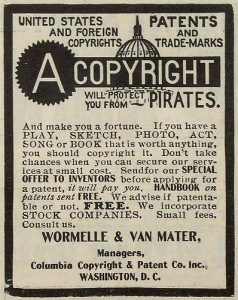Credit to Howard Knopf (@howardknopf) for bringing this story to my attention.
The relationship between copyright and freedom of expression is often overlooked. Yet these two legal spheres can interact at a delicate nexus. There is an inherent tension between copyright and free expression; a grant of copyright is also a grant to control a particular expression. It is generally assumed that the principles of freedom of expression are accounted for in various exceptions to which copyright allows (e.g. fair dealing in the UK or fair use in the US). However, every now and then a situation arises where the normal confines of copyright appear inadequate to deal with free speech claims. Yet, even in these situations, the likelihood of a party actually employing free speech arguments in a copyright context remains a rarity.
Official Code of Georgia
As these occasions can be few and far between it is always interesting to take stock when they do arise. One such example arose recently in the State of Georgia. The State issued a cease and desist order to Carl Malamud in relation to his website Public.Resource.org. Carl Malamud, through the website, had published an annotated version of Georgia’s legal code. Displeased with his actions the State formally asked him to remove and destroy all files containing the “the Official Code of Georgia Annotated” (hereinafter “O.C.G.A.”) from the Internet. This demand was on the basis that Mr Malamud was infringing the State’s copyright in the work.
It is fair to say that the cease and desist order was met with significant public dismay. A barrage of questions was being banded about various online forums: is the State attempting to reduce public exposure of the laws? Is it not an abuse of the mechanisms of copyright law to censor information that should be publicly available? Why would the State go through the protracted process of implementing a law then demanding that the law be removed from the general public’s view? However, by far the most important question was: does the First Amendment not protect the right to publicise the law?
Annotations to the Code
Before the public condemnation continues, it is important to point out a couple of minor details. The cease and desist order is not focused on the legal code as a whole but on “the copyrightable aspects” of “the Official Code of Georgia Annotated.” To provide a brief background to the law, state statutes are covered to a limited extent by copyright. This differs from the position of federal statutes that are not capable of being copyrighted. Further, it is important to make a distinction between the actual law detailed in the published legislation and the accompanying annotations.
The thrust of the State’s contention focuses on the accompanying annotations that have been published. The annotations provide shorts pieces of guidance, commentary, reference or direction. In most cases the annotations require someone with legal training to match up the pieces. In practical terms it requires labour in some cases a lot of labour. Thus, to produce the annotations, the State would be required to pay for these additional services from a third party. Alternatively a private company can do the work for nothing but in lieu obtain exclusive rights to publish the work in turn earning an income. This sort of arrangement is in fact in operation in the State of Georgia.
The State’s argument here is pretty straightforward. The Official Code of Georgia Annotated becomes worthless if other websites can publish it details. The publisher who has produced the annotations loses the ability to earn compensation, as the work is freely available to the public. In such a situation the State is under pressure to protect the interest of the party who has produced the work. Cue the cease and desist order. On the face of it this case seems relatively simple. However, the work that forms the subject of the case is not a novel, song, film or any other commercial work. It is the law of the land and that makes things a bit more complicated.
Ignorance of the law: an excuse?
It is perhaps useful at this point to bear in mind that the State of Georgia is not censoring the statutory code itself, that will be still be publicly accessible (see here). It is only the additional annotations that are subject to the cease and desist order – they are the “copyrightable aspects”. Nevertheless, Mr Malamud contends “The Official Code of Georgia Annotated is a publication of the State and it is the definitive statement by the State of the law. Any lawyer would ignore this publication and any of its components at his or her peril”. Essentially his argument dictates that the annotations are an integral part of the statute when attempting to decipher the text’s effect. As such the the “unannotated” version is a deficient alternative for the official law. It’s a fair point, legally qualified practitioners would have to agree that annotations can be absolutely indispensable when trying to understand the application and impact of a piece of legislation. Further, Mr Malamud is not attempting to educate the already legally trained. In fact his aim is one of general public edification and enlightenment. If we as lawyers find the annotations useful surely a layperson would be lost without them.
He also highlights the impact of the terms and conditions of use of the online version of the O.C.G.A. The terms only permit the reproduction of an “insubstantial portion”. Moreover the reproduction of the Code in “newsletters” and “articles” is prohibited. This means that the ability of the average member of the public to express something involving an excerpt of the code is significantly curtailed. On this Mr Malamud states “[a]s you can see, when copyright prohibits citizens from speaking the law of the land, substantial concerns are raised under the U.S. and Georgia Constitutions”. Again here his argument strikes at free speech concerns. Mr Malamud is simply underlining that the terms and conditions have implications on reproduction of expression. As such the First Amendment is engaged.
At the heart of Mr Malamud’s argument lies the over-arching clash between constitutional principles – copyright and free speech. As Mr Malamud states “[i]f citizens are required to obtain a permission before repeating the law, does that not strike at the very heart of our rights of free speech under the First Amendment? If ignorance of the law is no excuse, how can we restrict dissemination of those laws?” His argument is far from unreasonable. The measures of the State have the ability to restrict expression. Of course the State have an objective justification for that restriction. Yet it is unclear whether the State has taken into consideration the impact the censorship has on the guarantees under the First Amendment. Even after Mr Malamud has highlighted these concerns, will the fact that free speech has been implicated have any bearing on the State of Georgia’s subsequent actions?
Déjà vu?
This is not the first time that a state has commenced action to prevent the publication of its statutes. In 2008 the State of Oregon sent a takedown notice to Tim Stanley and his website Justia.com. The State similarly held claim to the Oregon Revised Statutes. The State claimed copyright in the “prefatory and explanatory notes, the leadlines and numbering for each statutory section, the tables the index and annotations and such other incidents as are work product of the Committee.” However, this was not a straightforward open and shut case. The State, taking into account the significance of the issue, called a public hearing of the Legislative Counsel Committee inviting Mr Stanley and Mr Malamud, amongst others, to discuss the issue. Video footage of the full public hearing from 2008 can be found here.
The Committee listened to the arguments and unanimously waived the copyright in the laws (the State did not disclaim that copyright existed but simply agreed not to enforce in the circumstances). The Committee discussed the impact that free access would have on the ability to profit from the copyright. According to the Committee the State earned an income of $2 million annually. When asked what impact the likes of Justia.com would have on their market the Committee candidly stated that they had no idea. In fact the Committee were more concerned about the accuracy of the law printed by Justia.com or any other administrator. They raised concerns that Justia.com may not keep up to date or fully reflect new changes and amendments. This could have a detrimental impact on the wider public looking to rely on the website. Nevertheless the Committee held in favour of the public having the widest access possible to this information.
Copyright and freedom of expression
So, where does this leave Mr Malamud and the Official Code of Georgia Annotated? The decision of the State of Oregon was not a court decision and in any case it was taken at state level so has no bearing on Georgia. Subsequently Senator McKoon, Chairman of the Georgia Code Revision Commission, has responded to the various lines of public dismay (click here to see his full response). The letter makes clear that the State will pursue all remedies. However, it is unclear thus far what the State will do next. In the meantime the O.C.G.A. remains publicly available on Public.Resource.org (see here).
I mentioned at the start of this article that copyright and free expression can occasionally meet at a delicate nexus. Further, that it is generally accepted that the law of copyright accommodates for the principles of free expression in the various exceptions detailed in statute. However, if you take anything from Mr Malamud’s predicament it should be the concept that the traditional bounds of copyright are sometimes incapable of fully accommodating free speech concerns. The above is far from a clear-cut example definitively showing that freedom of expression has an explicit place in the context of copyright claims. Nevertheless, fair use could not be flexible enough to offer a defence to Mr Malamud. The strongest argument he has to offer is that directly under the First Amendment.
The above should, however, form as an example that copyright can be challenged out with its traditional scope. It is not suggested that in every copyright case a plenary interpretation of relevant free speech principles must be rendered. Rather that we must not overlook the fact that the principles of free expression have an explicit role to play in the overall scheme of copyright law. The system of copyright should not be impenetrable to the jurisprudence on free speech. Copyright and free speech are both enshrined in the Constitution and neither of them have a hierarchy. In fact the Constitution should be interpreted as a single document. Copyright legislation should not constrain the power of the Constitution; the Constitution should define the powers and limits of copyright. To do this reference must be made to the First Amendment.
For more on copyright and freedom of expression generally click here.
Image courtesy of Ioan Sameli on Flickr
